

Students Tell It Like It Is. Teaching and Learning | Feature Students Tell It Like It Is.
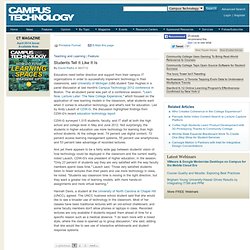
Richard Guarasci: How Colleges Can Spark Economic and Community Development. In my last post, I discussed what I, and many of my colleagues, consider the growing crisis in higher education and the stiff challenges that those of us in America's colleges and universities now face.
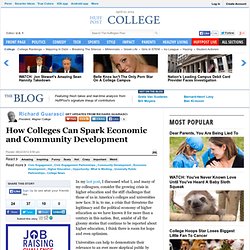
It is, to me, a crisis that threatens the legitimacy and the political economy of higher education as we have known it for more than a century in this nation. But, amidst of all the gloomy stories that continue to be reported about higher education, I think there is room for hope and even optimism. Universities can help to demonstrate their relevance to an ever more skeptical public by ramping up civic engagement programs within their local communities and by creating specific partnerships. Minding the Campus. Report reveals divergent views on where to take U. of North Texas at Dallas. It might not come as a surprise to a lot of people, but a group of university faculty and staff members and a group of Fortune 500 management consultants have different ideas about how a university should be structured and run.
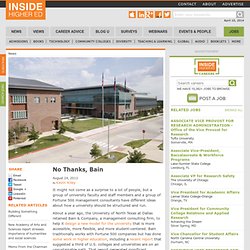
About a year ago, the University of North Texas at Dallas retained Bain & Company, a management consulting firm, to help it design a new model for the university that is more accessible, more flexible, and more student-centered. Bain traditionally works with Fortune 500 companies but has done some work in higher education, including a recent report that suggested a third of U.S. colleges and universities are on an unsustainable path. That report generated significant discussion at this year's annual meeting of the National Association of College and University Business Officers, with many finance officials calling it overly simplistic. The consultants made recommendations to the university’s administration this spring. Calif. community college goes out-of-state with online degree partnerships. California’s Coastline Community College is set to create low-cost, online bachelor’s degree pathways where students can enroll simultaneously at one of three public universities, none of which are in California.
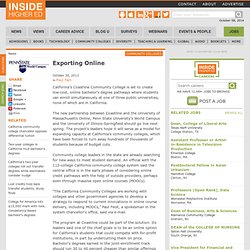
The new partnership between Coastline and the University of Massachusetts Online, Penn State University’s World Campus and the University of Illinois-Springfield should go live next spring. The project’s leaders hope it will serve as a model for expanding capacity at California’s community colleges, which have been forced to turn away hundreds of thousands of students because of budget cuts. Community college leaders in the state are already searching for new ways to meet student demand. An official with the 112-college California community college system said the central office is in the early phases of considering online credit pathways with the help of outside providers, perhaps even through massive open online courses (MOOCs). Not everyone is excited about the idea. Skills Gap? Employers and Colleges Point Fingers at Each Other - Next.
For much of the first decade of the new millennium, Samuel J.
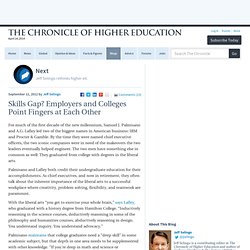
Palmisano and A.G. Lafley led two of the biggest names in American business: IBM and Procter & Gamble. By the time they were named chief executive officers, the two iconic companies were in need of the makeovers the two leaders eventually helped engineer. The two men have something else in common as well: They graduated from college with degrees in the liberal arts. Palmisano and Lafley both credit their undergraduate education for their accomplishments. With the liberal arts “you get to exercise your whole brain,” says Lafley, who graduated with a history degree from Hamilton College. College Degrees Aren't Umbrellas. Much of this hefty study is devoted to the labor market changes following the economic recession that began in 2007.
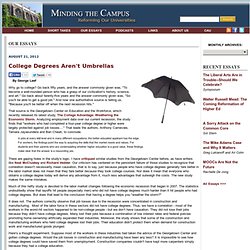
The statistics undoubtedly show that layoffs hit people (especially men) who did not have college degrees much harder than it hit people who had college degrees. But does that lead to the conclusion that having a degree helps you "weather the storm? " It does not. The authors correctly observe that job losses due to the recession were concentrated in construction and manufacturing. Most of the labor force in these sectors did not have college degrees. Here's a thought experiment. Here is another thought experiment. Actually, that doesn't have to be just a thought experiment. Hashing over the employment data for the last five years just doesn't prove the point the authors want readers to accept.
But doesn't it give you "an advantage? " Not at all. Sallie Mae survey highlights a changing marketplace for students. College administrators are justifiably worried about whether they're going to be able to balance their budgets in a changing economic landscape, and a survey released by Sallie Mae last month didn't do much to put them at ease.
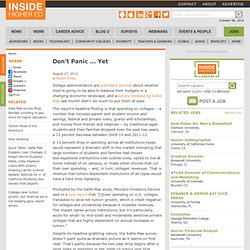
The report’s headline finding is that spending on colleges -- a number that includes parent and student income and savings, federal and private loans, grants and scholarships, and money from friends and relatives -- by traditional-aged students and their families dropped over the past two years, a 13 percent decrease between 2009-10 and 2011-12. A 13 percent drop in spending across all institutions types would represent a dramatic shift in the market indicating that large numbers of students and families had chosen less-expensive institutions over costlier ones, opted to live at home instead of on campus, or made other choices that cut their own spending -- and, in turn, colleges' revenues.
Not as Bad as You Think? Private Concerns Public Sector Problems. Northern Arizona U. partners with Pearson on competency-based degree programs. Northern Arizona University has inked a deal with Pearson to co-develop three fully online baccalaureate degree programs based on the increasingly popular and somewhat controversial “competency based” model of higher education.
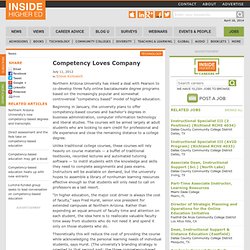
Beginning in January, the university plans to offer competency-based courses and bachelor’s degrees in business administration, computer information technology and liberal studies. How Stanford wants to Ride the Wave of Online Learning. In January Stanford President John Hennessy said in a Faculty Senate meeting that online education is a tsunami academia has to face.
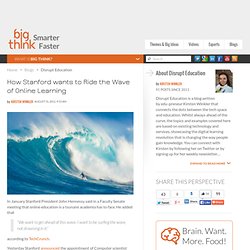
He added that “We want to get ahead of this wave. I want to be surfing the wave, not drowning in it.” according to TechCrunch. Yesterday Stanford announced the appointment of Computer scientist John Mitchell as new vice provost for Online Learning. The creation of the Office of the Vice Provost for Online Learning (VPOL) is also a commitment to bring new teaching and learning methods to Stanford students around the globe. Center on Education and the Workforce -
August 15, 2012 Executive Summary Full Report Press Release Media Coverage Many of the stories you've heard about the Great Recession often involve the plight of college graduates, or stories about how men and women have fared differently in the recession and recovery.
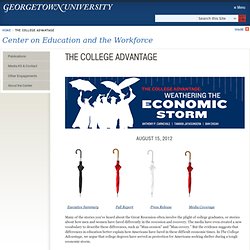
The media have even created a new vocabulary to describe these differences, such as "Man-cession" and "Man-covery. " But the evidence suggests that differences in education better explain how Americans have fared in these difficult economic times. In The College Advantage, we argue that college degrees have served as protection for Americans seeking shelter during a tough economic storm.
Our main findings are detailed below: Do Too Many Young People Go to College? Bain Tool Aims to Gauge Colleges' Financial Sustainability. Business News & Financial News - The Wall Street Journal - Wsj.com. College Debt Hits Well-Off. Going for broke: how universities can deliver on their economic potential. Thinking beyond science parks: universities need to create a network of research and innovation enterprise zones. Photograph: Lehtikuva OY / Rex Features Let me start by saying that I am not a proponent of directing academics away from blue-sky research towards second-rate contract research for the highest bidder.
Changing postsecondary education must be a collective process. The Ontario government recently released a discussion paper on postsecondary-education reform. Among the topics on the agenda: system transformation; a potential move in some programs to three-year degrees; greater use of “technology-enabled” learning; and a much simpler mechanism for transferring course credits between college and university. Providing a backdrop to these high-minded goals is the need to save money in a sluggish economy within which public-sector costs are projected to outrun revenues for the foreseeable future.
Apart from ongoing operating and deferred maintenance shortfalls, nearly every university in the province faces some form of pension deficit. And, as the experience of Quebec shows, tuition increases are a politically volatile issue. It is clear that the current system of publicly funded postsecondary education is in trouble. Change will happen, though it is likely to be slower than government or some media observers might prefer. Study documents value of college degree, even in this recession.
Center on Education and the Workforce - Georgetown University.